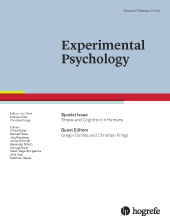Stress and Cognition in Humans
Current Findings and Open Questions in Experimental Psychology
References
(2012). The combined dexamethasone/TSST paradigm – a new method for psychoneuroendocrinology. PLoS One, 7, e38994. 10.1371/journal.pone.0038994
(2013). The combined propranolol/TSST paradigm – a new method for psychoneuroendocrinology. PLoS One, 8, e57567. 10.1371/journal.pone.0057567
(2005). Endocrinology of the stress response. Annual Review of Physiology, 67, 259–284. 10.1146/annurev.physiol.67.040403.120816
(2009). Stress and disorders of the stress system. Nature Reviews Endocrinology, 5, 374–381. 10.1038/nrendo.2009.106
(2014). From receptor balance to rational glucocorticoid therapy. Endocrinology, 155, 2754–2769. 10.1210/en.2014-1048
(2020). Acute stress improves concentration performance – opposite effects of anxiety and cortisol. Experimental Psychology, 76, 88–98. 10.1027/1618-3169/a000481
(2004). Acute stressors and cortisol responses: A theoretical integration and synthesis of laboratory research. Psychological Bulletin, 130, 355–391. 10.1037/0033-2909.130.3.355
(2020). Central sympathetic nervous system effects on cognitive-motor performance. Results from a placebo-controlled pharmacological study. Experimental Psychology, 76, 77–87. 10.1027/1618-3169/a000475
(2019). Negative priming is diminished under high blood pressure in healthy subjects. Journal of Neural Transmission, 126, 1111–1114. 10.1007/s00702-019-02032-w
(2016). Acute stress and episodic memory retrieval: Neurobiological mechanisms and behavioral consequences. Annals of the New York Academy of Sciences, 1369, 55–75. 10.1111/nyas.12996
(2020). Balancing between goal-directed and habitual responding following acute stress. Experimental Psychology, 76, 99–111. 10.1027/1618-3169/a000485
(1993). The ‘Trier social stress test’ – a tool for investigating psychobiological stress responses in a laboratory setting. Neuropsychobiology, 28, 76–81. 10.1159/000119004
(2005). Sex differences in HPA axis responses to stress: A review. Biological Psychology, 69, 113–132. 10.1016/j.biopsycho.2004.11.009
(2020). Working memory performance under stress: Do women profit from cortisol release, whereas men don’t? A study in healthy older adults. Experimental Psychology, 76, 132–139. 10.1027/1618-3169/a000484
(2009). Effects of stress throughout the lifespan on the brain, behaviour and cognition. Nature Reviews Neuroscience, 10, 434–445. 10.1038/nrn2639
(2000). Allostasis and allostatic load: Implications for neuropsychopharmacology. Neuropsychopharmacology, 22, 108–124. 10.1016/s0893-133x(99)00129-3
(2020). The opposite of stress: High vagal tone and its relation to divergent thinking. Experimental Psychology, 76, 150–159. 10.1027/1618-3169/a000483
(2020). How do stress and social closeness impact prosocial behavior? Experimental Psychology, 76, 123–131. 10.1027/1618-3169/a000482
(2020). The forward testing effect is immune to acute psychosocial encoding/retrieval stress. Experimental Psychology, 76, 112–122. 10.1027/1618-3169/a000472
(2011). Memory modulation. Behavioral Neuroscience, 125, 797–824. 10.1037/a0026187
(2013). Stress and cognition. Wiley Interdisciplinary Reviews: Cognitive Science, 4, 245–261. 10.1002/wcs.1222
(2013). For whom the bell (curve) tolls: Cortisol rapidly affects memory retrieval by an inverted U-shaped dose–response relationship. Psychoneuroendocrinology, 38, 1565–1572. 10.1016/j.psyneuen.2013.01.001
(2018). Ten years of research with the socially evaluated cold pressor test: Data from the past and guidelines for the future. Psychoneuroendocrinology, 92, 155–161. 10.1016/j.psyneuen.2018.03.010
(2017). The effects of acute stress on episodic memory: A meta-analysis and integrative review. Psychological Bulletin, 143, 636–675. 10.1037/bul0000100
(2016). The effects of acute stress on core executive functions: A meta-analysis and comparison with cortisol. Neuroscience and Biobehavioral Reviews, 68, 651–668. 10.1016/j.neubiorev.2016.06.038
(2020). Acute psychosocial stress modulates the detection sensitivity for facial emotions. Experimental Psychology, 76, 140–149. 10.1027/1618-3169/a000473



